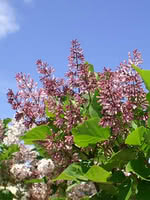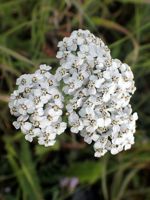Mon-Fri 9am - 5pm Mountain time
Manchurian Lilac (Korean Lilac) vs Yarrow
Syringa pubescens ssp. patula
Achillea borealis (Previously Achillea millefolium)
NOT AVAILABLE THIS SEASON
NOT AVAILABLE THIS SEASON
(new stock expected: fall of 2026)
Manchurian Lilac (aka Korean Lilac) is a medium-sized shrub that features fragrant clusters of pale purple flowers in late spring.
Manchurian Lilac is less affected by disease than other lilacs and will create a beautiful border, hedge, or privacy screen. If you are looking for a lilac for your shelterbelt, consider Common Purple Lilac or Villosa Lilac first.
Yarrow is a herbaceous, native wildflower that is found across Canada. It features large, flat clusters of tiny white flowers. The blooms attract a variety of pollinators, making it an ideal choice for pollinator gardens. While partial shade is tolerated, the best flowering occurs in full sun. Yarrow is resistant to deer and rabbits, making it both a beautiful and practical addition to your landscape.
The entire plant is edible, but leaves and flowers are most commonly consumed. They have a strong licorice scent and a mild sweet flavor that is similar to tarragon. Yarrow leaves can also be used as a natural insect repellent.
It is important to plant Yarrow in the right place, it can spread quickly via both rhizomes and self-seeding. Deadheading the spent flowers will extend the bloom season and can help limit self-seeding.
Manchurian Lilac (Korean Lilac) Quick Facts
Yarrow Quick Facts
Toxicity: toxic to dogs, cats, and horses

